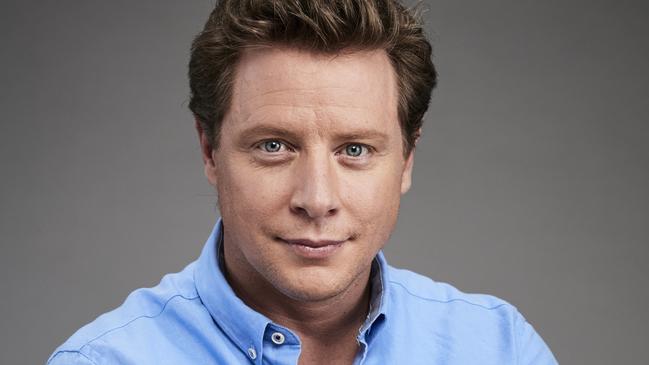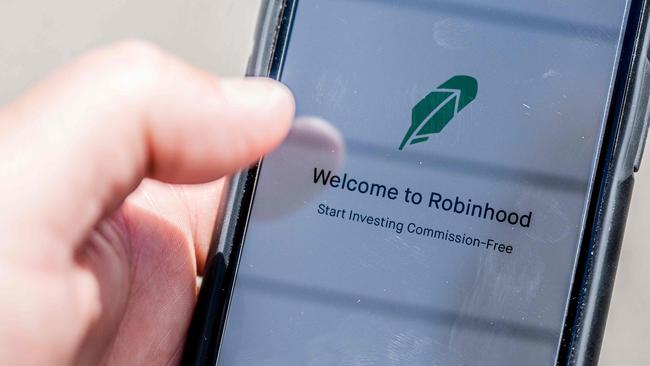Barefoot Investor: Why investment apps are toxic to your wealth and health
Instant trading apps, particularly those aimed at Millenials, turn buying and selling stocks into a game and can have a deadly impact on your finances and your future, writes Barefoot Investor.

Barefoot Investor
Don't miss out on the headlines from Barefoot Investor. Followed categories will be added to My News.
A father was walking past his 20-year-old son’s empty room when something caught his eye.
A Post-It note was taped to the middle of his son’s computer screen.
“Turn on the computer,” it read.
It took 30 seconds to boot up his son’s computer … and 10 seconds to turn his life upside-down.
“If you are reading this, then I am dead,” the letter began.
What follows is the true — and tragic — story of a young American university student named Alexander Kearns.
Like many guys his age, Alexander began share trading during the pandemic.
Also like many guys his age, he kicked things off by downloading the Millennial-friendly trading app Robinhood.

Robinhood is the hottest finance app in the world, with 13 million accounts. It not only offers free trades, you can open an account with just a few bucks, which is a big reason Millennials love it.
Yet the real reason it’s so popular is that the app has gamified the trading process. Digital confetti falls onto the screen after you make your first trade.
And the app sends push notifications to your phone to encourage you to keep trading.
For his part, Alexander began trading highly risky options contracts on Robinhood.
The night before he took his life, Alex logged into his account and got the shock of his life:
A trade gone wrong. Very wrong. $730,165 wrong!
For a university kid living at home with his parents, it was a mind-boggling amount of money to come up with.
Money he didn’t have.
In a blind panic, he wrote his letter, attached the Post-It note to his screen, and jumped on his bicycle … never to be seen again. Of course, suicide is rarely caused by just one event, yet stressful experiences can be a trigger.
Robinhood’s mission is to “democratise finance for all … making investing friendly, approachable, and understandable for newcomers and experts alike”.
Well, this week Australia got its own Millennial-focused trading app, called Superhero.
Like Robinhood, Superhero’s goal is to “make investing accessible and understandable for everyone — no matter if you’re a seasoned trader or buying your first stock”.
Like Robinhood, it offers cheap trading, charging a flat fee of $5 per ASX trade, with minimum investments of $100.
Unlike Robinhood, Superhero doesn’t offer risky options trading.
I spoke to their CEO this week, and he seems like a decent bloke who is aiming to simultaneously attract new and younger investors into the market and bring down the costs of trading.
Still, I am not a fan of apps like these.
Yes they’re cheap, yet they encourage often young and inexperienced users to trade, and that is toxic to their wealth.

Contrast this approach to Vanguard, the largest fund manager in the world, which is owned by its members.
When they unveiled their ‘personal investor’ offering earlier in the year, they gave me a demo.
They had intentionally added in ‘friction points’ in the buying and selling process to dissuade people from actively trading. And I absolutely LOVED it.
“Make it more boring!” I cheered.
In fact, I suggested that they didn’t need to build an accompanying app: “Just keep it on the daggy desktop. There’s no need to trade shares when you’re on the toilet.”
(They’re in the process of creating an app.)
Still, my idea of a great investment app is something you set up once: a regular investment into various low-cost index funds. In other words, set-and-forget.
And that is a plan that would have worked out well for Alexander, a young man with the world at his feet.
Instead, his father sat at his son’s computer reading his suicide note.
His son was distraught at losing so much money, and admitted in his letter that he had “no clue” about trading.
Tragically, he was right.
Even more tragically, Alexander had actually misread his Robinhood account balance: he hadn’t lost the money at all.
Tread Your Own Path!
Rest In Peace, Alexander Kearns
If you or someone you know needs help, contact Lifeline on 13 11 14 or visit lifeline.org.au.
THEY’RE COMING OUT OF THE WOODWORK
TED AND EILEEN WRITE: I’ve just read your article entitled “The Horses”. My wife was tricked into buying an almost identical funeral insurance policy from Insuranceline. We estimate we have paid $35,000 in premiums since 2007, with a payout cover of just $6,000 each. My wife and I are now in our seventies, with the age pension as our only income. And, as you know, they keep increasing premiums as we get older. I’m stressed. What can we do?
BAREFOOT REPLIES: I’m used to getting a lot of emails. Yet I’ve been blown away by the number of people who’ve written to me in a similar situation to you.
Your wife entered into this financial transaction not out of greed but out of kindness and selflessness: She didn’t want to be a financial burden on her family.
Sadly, too many insurance companies manipulate this emotion for their own gain.
The problem is that, in some cases, if you stop paying the rising premiums you can lose your cover (though you should definitely check the wording in your policy or call a financial counsellor on 1800 007 007 to help you with it).
Yet if you keep paying you may not be able to afford to travel and see your grandkids. Or do Christmas presents.
The irony is that if you were to speak to your family, you’d find they’d rather you spend the money enjoying yourself than living your final years being stressed out about money.
Besides, a private funeral typically costs around $4,000 for a basic cremation, or up to $15,000 for a more elaborate burial, according to ASIC’s MoneySmart.
I’d encourage you to make a formal complaint to the insurer in writing, and if you don’t get an appropriate outcome take it up with the Australian Financial Complaints Authority (ACFA) on 1800 931 678.

MY ‘FAKE RICH’ LIFE
NATE WRITES: I started reading your book when I was lying by a five-star pool in Dubai, which I had booked on my credit card. I was living a “fake rich” life, holding down a high-paid job but living week to week. I had $23,500 in credit card debt, a loan for my Lexus, and no savings. You opened my eyes and forced me to stop kidding myself. I set up my buckets and started paying off the debts one by one. I sold my car and started cycling everywhere. A house is in touching distance and I cannot wait for everything else to come, because I am now READY!
BAREFOOT REPLIES: Well done. The hard thing about money is that it works the opposite of fitness:
If you’re unhealthy, your muffin-top is on show for everyone to see: there’s no hiding it.
Yet with money it’s often the financially fattest people who look the fittest!
And that explains why I don’t watch reality TV … though my wife loves trashy shows like The Bachelor.
The other night I was walking past her and I casually mentioned, “Hey, did you know one of those reality stars wrote to me asking for advice?”
It was the only time that evening she took her eyes off the TV.
“OH MY GOD, WHO WAS IT?!” she yelled.
“Huh? I don’t remember. As soon as they wrote that they were an Instagram influencer, I deleted it and moved on.”
She just stared at me for a second, then went back to watching her show.
(No rose for me.)
I’ve always said that the hard life is living week to week, desperately trying to keep up appearances.
Being broke drains you of your energy and self-confidence, and clouds your opportunities.
Gaining control of your money gives it back, and then some.
You Got This!
Got a money question? Visit barefootinvestor.com and #askbarefoot
DISCLAIMER: Information and opinions provided in this column are general in nature and have been prepared for educational purposes only. Always seek personal financial advice tailored to your specific needs before making financial and investment decisions.
The Barefoot Investor for Families: The Only Kids’ Money Guide You’ll Ever Need (HarperCollins) RRP $29.99
READ MORE:
WHY SPENDING TIME WITH YOUR DAD A GREAT INVESTMENT
WHO IS REALLY GETTING SCREWED BY THE COVID ECONOMY
HOW FINANCIAL FITNESS WILL HELP YOU SLEEP SOUNDLY
Originally published as Barefoot Investor: Why investment apps are toxic to your wealth and health


